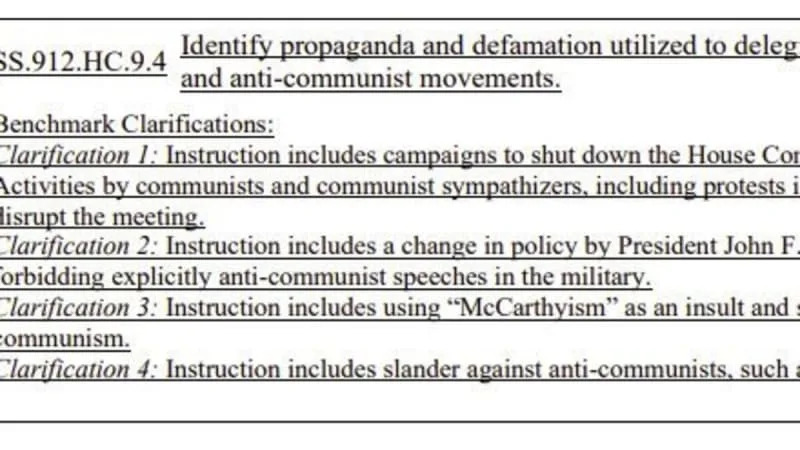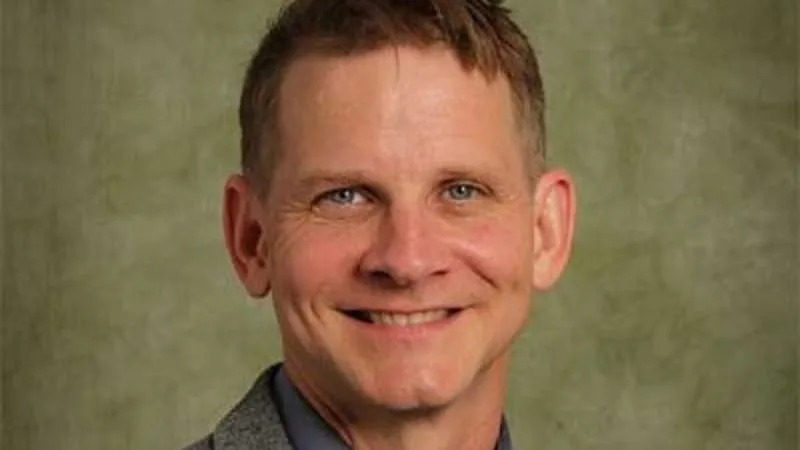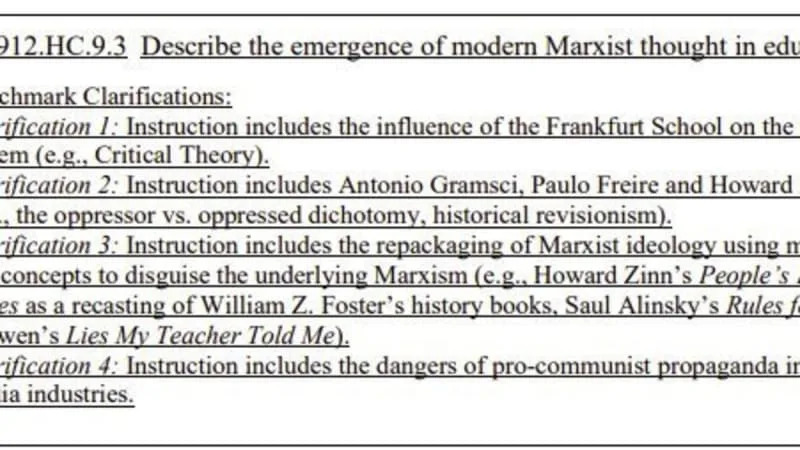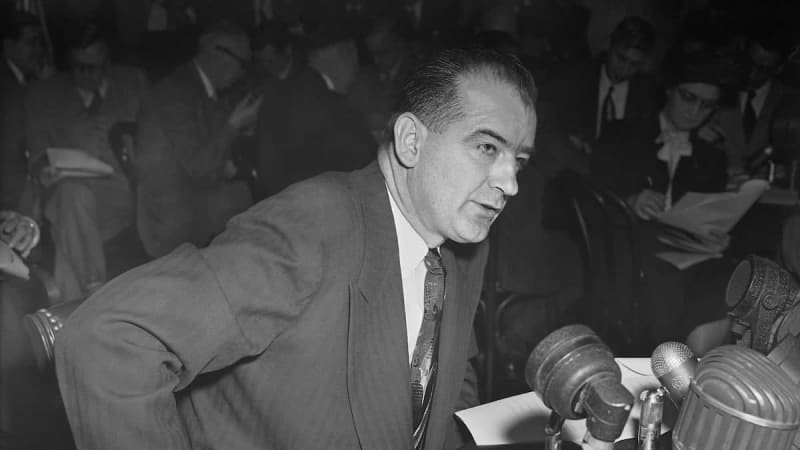Florida high school students could soon be taught a Cold War–era view of communism that echoes the rhetoric of that time under social studies standards proposed for classrooms statewide.
Among the lessons up for instruction: John F. Kennedy’s “forbidding” of anti-communist speech in the military; how terms such as “McCarthyism” and “Red Scare” were used to delegitimize right-wing movements; and “the dangers of pro-communist views in entertainment and media.”
The proposal, scheduled for the State Board of Education to consider on Nov. 13, comes after 2024 bipartisan legislation was passed that aimed at revisiting how Florida schools teach about communism. If the board votes to approve thelessons in mid-November, they wouldbe taught in classrooms statewide starting nextfall.

Florida’s initiative arose from Gov. Ron DeSantis’ calls to ensure that students are properly civic-minded. Lawmakers promoting the bill said they did not intend to use the standards to indoctrinate children or spread fear, leaving the details to the Department of Education.
Historiansasked by the Tampa Bay Times to review the proposal say the 30 pages of recommendations — more than twice the length of proposed standards for teaching civics — are skewed to promote a viewpoint rather than encourage critical thought.
“It’s a highly biased picture,” said Jonathan Zimmerman, a University of Pennsylvania professor who teaches about the history and politics of education. “It has an antiquarian ring. It sounds like the Cold War.”
In many ways, the academic guidelines arenot far removed from that era, as they echo Florida’s “Americanism vs. Communism,” a 30-hour required course first offered in 1961. As Education Week reported, Florida lawmakers at the time wanted to make sure that students understood the “true nature” of the communist threat.

The Legislature ended the requirement in 1991. Some legislators argued it encouraged the use of propaganda to make a point.
“This is basically a resurgence of that,” said Seth Cotlar, a history professor at Willamette University in Oregon, adding that parts of the proposal reflect ideasespoused by afascist group leader he’s studied.
The revisionist takes on Kennedy and former Sen. Joe McCarthy stood out to the academics.
McCarthy was censured by the U.S. Senate after the four years he spentholding hearings that accused hundreds of Americans of being communists, often without facts.

“Many people’s careers and lives were destroyed. That was the heart of McCarthyism,” Zimmerman said. “McCarthyism should be an insult insomuch as it connotes unfair labeling of people as communists.”
Opposing McCarthy’s practices did not necessarily mean supporting communism, he added, noting that the vast majority of Americans at the time were anti-communist. So the suggestion in the standards that using the term “McCarthyism” is a slur aimed at defaming anti-communist movements rings hollow, he said.
Even so, many Republicans have for years sought to restore McCarthy’s reputation, he wrote in a 2019 Washington Post column. While that attitude began to shift when Donald Trump accused his critics of using what he called McCarthyist tactics, the sentiment persists, he noted.
Teaching that Kennedy forbade anti-communist speeches in the military also is misleading, Cotlar said.
Kennedy did disciplineGen. Edwin Walker over indoctrinating his troops with right-wing propaganda from the John Birch Society, a small but influential organization known for advancing conspiracy theories, harassing political enemies and fighting against civil rights. Walker was later arrested for seditious conspiracy, insurrection and rebellion after protesting the enrollment of James Meredith, the first Black student to attend the University of Mississippi.
Walker claimed the Kennedy administration was persecuting him.
Much of the proposed instructional material is “straight up John Birch talking points,” Cotlar said.
He also cited a reference to the Hollywood Anti-Nazi League and a mention of a 1960 San Francisco protest against the House Un-American Activities Committee.

Adam Laats, an education historian at Binghamton University, said the standards follow similar efforts across the nation. Groups such as the American Legion and the Daughters of the American Revolution pressured officials and schools to adopt anti-communism education with varying degrees of success.
Despite Florida leaders urging children to think for themselves, the standards read more like “a need to tell children why these seductive ideologies are dangerous,” Laats said.
He pointed to DeSantis’ statement when signing the anti-communism history legislation that schools must teach students about the “evils and dangers of Communism.” The governor’s press release also touted the legislation as a way to prepare students “to withstand indoctrination on Communism at colleges and universities.”
Laats said the proposal names authors, organizations and entities it claims to beaffiliated with communism, including the media and academia.

Zimmerman said such standards cry out for clarity. He pointed to a reference to author James Loewen as a Marxist. He said Loewen — who he knew — was not a Marxist, but someone who questioned whether the United States met its promise of liberty and justice for all.
Americans should not be afraid to ask such questions, Zimmerman said.
As written, he said, the standards make communism appear as “this force inserting itself into everything.”
“Where is the evidence for that?” Zimmerman said.
The standards also read like a wish list of right-wing and conservative thinkers, without consideration as to whether teachers could fit it all into a course, Laats added.
The Florida Department of Education did not provide a list of those involved in writing the material or any other information about the standards development.
The department is accepting public comment on the standards online.
Cindy Marie Jenkins, who has two children in Orange County schools, is paying attention. She said she grew up in a conservative family where what she knew about communism was “it’s bad” and McCarthy went too far, betraying people’s trust.
She wondered what had changed.
“In today’s media landscape, with intentional threats against free speech, independent media, and anything that removes the veneer of American exceptionalism, rebranding McCarthy only brings us in line with the very oppressive governments that these standards say they want to warn us against,” Jenkins said via email.
Jenkins, a media literacy educator for children, worried about arriving in a place where people aren’t willing to hear criticism of America: “I was taught in school that freedom of speech equals America, especially when questioning your government.”
Jeffrey S. Solochek is a reporter covering education as a member of the Tampa Bay Times Education Hub. You can contribute to the hub through our journalism fund by clicking here.

